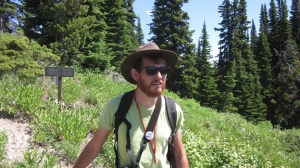WKU undergraduate geology majors Melanie Newton and Stuart Kenderes were involved this summer in nationally competitive Research Experiences for Undergraduates (REU) programs, funded primarily through the National Science Foundation.

Melanie Newton conducted research this summer near Yellowstone National Park. (Photo by Andrew Wulff)
Melanie Newton of Cox’s Creek worked with professors from Montana State University, Louisiana State University and the University of Florida. Her project focused on the magmatic history, field and temporal relationships of a variety of igneous rocks near Coulter Campground adjacent to Yellowstone National Park. The rocks exhibit a range of interesting (and enigmatic) textures associated with modes of emplacement and petrogenesis. These rocks and textures are compared with the nearby Long Lake Complex to extend the possible petrogenetic models. Her work so far this summer has primarily involved mapping and sample collecting in and around Yellowstone, working near Hellroaring Trail, Garnet Hill, Junction Butte and Slough Creek in order to determine the relationships between the Archean basement rocks. A primary purpose is to gather data for zircon dating, geochemistry and isotope and REE analysis in order to determine information such as age, source (fractional crystallization, assimilation, magma mixing) and history in relation to other Archean bodies and the host rock. She also spent some time processing samples at Montana State University and doing more field work around Cooke City, Mont., in order to compare their data to other igneous complexes in the region.

Stuart Kenderes conducted research this summer in mountain ranges in northwest Wyoming. (Photo by Ben Kraushaar)
Stuart Kenderes of Independence worked on a project titled “Eocene Tectonic Evolution of the Teton-Absaroka Ranges, Wyoming” researching a variety of outstanding problems in the tectonic evolution of the Sevier-Laramide orogens as exposed in the Teton and Absaroka ranges of northwest Wyoming. The lead faculty on this project were Dr. Dave Malone (Illinois State University) and Dr. John Craddock (Macalester College), who also received funding through the Keck Foundation. Kenderes studied carbonate and igneous rocks of White Mountain and a possible ancient kimberlite eruption in the Sunlight Basin, with a special focus on determining the geochemical and temporal relationships of these rocks. After completing fieldwork, Kenderes spent time at Macalaster College preparing samples for analysis and separating zircons from sediment samples for age determinations. The project will also involve travel to the University of Arizona-Tucson next January for U/Pb analysis of the zircons and biotites to reconstruct paleogeography of the area.
Both Newton and Kenderes will continue to work on their research with Dr. Andrew Wulff at WKU during the upcoming academic year.
“These types of research experiences for undergraduates can be life-changing,” noted Department of Geography and Geology Head Dr. David Keeling. “The department’s recent success in getting students to participate in REU programs is a testimony to the hard work and mentoring of the faculty but also to the quality of our students.”
Contact: Andrew Wulff, (270) 745-5976.

